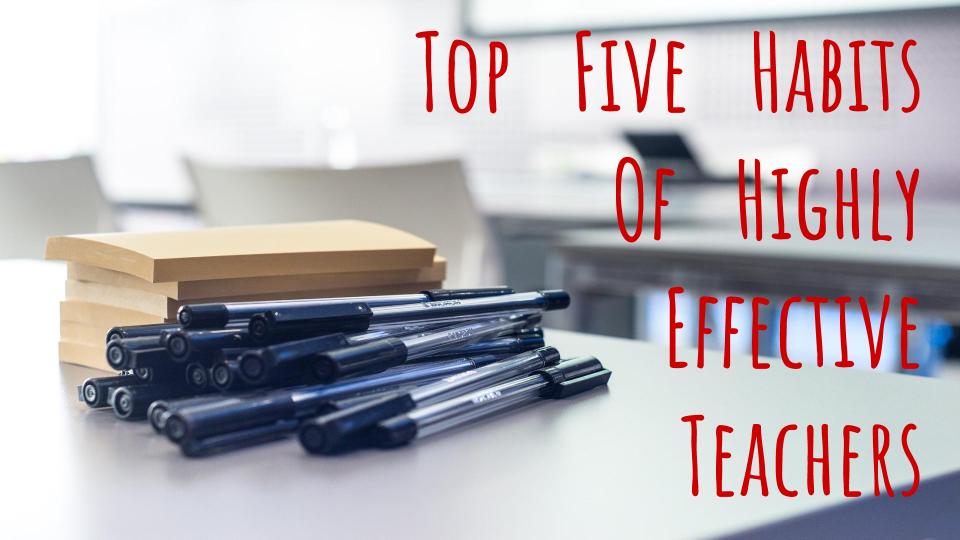There are some habits that are common among all effective teachers, and
I’d like to preface this blog by admitting that I am not a teacher extraordinaire. I have not been awarded any Teacher of the Year awards.
However, I do feel I am a very reflective teacher and learn from my mistakes daily.
Through my experience, and perhaps my OCDness, I’ve learned an effective teacher needs habits. Habits strengthen your procedures and help you focus on the most important part of your classroom – your students.
Many people in leadership positions have been recommended or have already read Stephen Covey’s The Seven Habits of Highly Effective People.
Much of his concepts seem common sense as you read, but so often, we fail to form good habits.
I read the book in college and after ten years of teaching these are the practices that I feel are the top five habits of highly effective teachers:
1. Create procedures, teach procedures, and reteach procedures
One of the most essential things for classroom management is developing classroom procedures. Harry Wong describes this in his book The First Days of School: How To Be An Effective Teacher.
You need a plan for: how and when should students sharpen pencils, throw away trash, go to the restroom; when is it appropriate for students to talk; what should students do when they complete an assignment.
There are countless interactions throughout the day and effective teachers will teach procedures early in the school year and continue to reteach those procedures throughout the year.
2. Use the cloud
Ever been at home and have an idea to fix/improve a future lesson but you did not bring home your laptop, or your jumpdrive, or your paperwork?
Effective teachers use cloud services so they have access to their lesson plans, assignments, and tests anywhere they go. Don’t be hesitant either. I remember being a creature of habit and wanting to stick to my handy jumpdrives, but on more than one occasion I had left my jumpdrive somewhere that I could not get to it or worse I had jumpdrives fail.
Switching to Google Drive was a true blessing. Now, I can make changes to my files anywhere I have access to internet.
3. Don’t grade everything
This may strike some of you as absolutely insane, but this is the mistake I see as causing the biggest stress-load.
Here’s what I mean – there should never be an assessment that takes unnecessary time from your students while at work or from your family while at home. People are why we are in this profession. For example if you give 10 problems on an assignment, what is wrong with only checking 3 to 4 of them.
The students do not have to know which ones you are going to check, but they are getting the necessary practice, and you can check their skill mastery by choosing the most essential questions to the assignment.
If you are giving writing assignments, instead of reading every single one, allow the students to choose the assignment they want you to grade.
4. Reflect on your teaching
Effective teachers are constantly reflecting. Analyze your lessons each day and figure out what went well and you never want to do again. Some teachers even use journals to write daily or weekly reflections. It will help you grow as a teacher, but in addition, when you spend the time to reflect you can make corrections for the future.
Improve and correct your lesson plans, assignments, and anything else that’s necessary so that you will be even better next time. Reuse your lesson ideas. That’s not lazy teaching that’s effective teaching.
5. Meet them at the door
This is literal as well as figurative. Meet your students at the door as they enter your classroom. Add a personal touch before class even starts. I was amazed by these teachers featured on the ABC and CBS Nightly News who have personalized handshakes with each of their students.
That’s a super cool thing to do with your students, but more importantly, spend time with your students. This can be through conversations, their sporting events, their extracurricular activities, field trips, or any other opportunities where the students see you
Conclusion
There is no secret formula to becoming great at anything, but by developing these good habits, you are sure to become a more effective teacher.
If you found any value in this, please share it with someone.
If you have any other ideas, please share them in the comments below. And, if you want a good laugh, check one of my previous blogs, Funny Story: Things You Thought You’d Never Say.
Thank you for the support. Your viewership truly means a lot.



